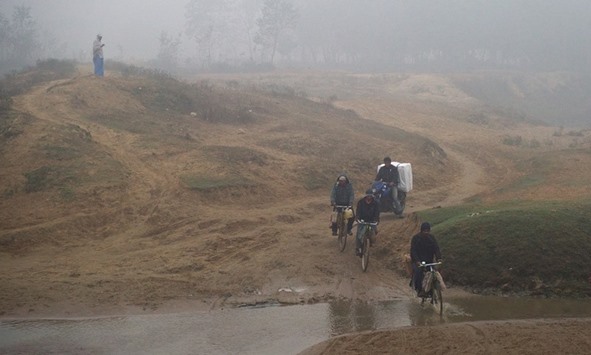The smugglers emerge out of the thick morning fog that hangs low over Nepal’s southern plains, riding bicycles and motorbikes loaded with empty petrol drums and gas cylinders. They splash across a shallow stream, all that marks this part of the border with India, and disappear again into the fog.
An hour later they are back, petrol drums filled and empty gas cylinders exchanged for full ones, a disorderly procession doing what Nepal’s government has largely failed to do for four months: provide fuel to its citizens.
Nepalese people have always freely crossed the open border with India, but since September, when the local ethnic Madhesi imposed a blockade on the country’s official crossings to protest against the new Nepalese constitution, unofficial cross-border trade has soared.
“At night time there are so many people crossing,” said a smuggler who started work shortly after the blockade began. Kumar Yadav (not his real name) added: “At least 20% of people in every village are doing this.”
Once back on Nepalese soil, the smugglers ride off towards Janakpur, to sell the fuel for a small profit. Some go to local businesses and homes and some to dealers who ship it on to the capital, Kathmandu, an eight-hour drive away.
Each individual load is small – a smuggler can only carry 40-50 litres of petrol at a time – but the thousands shuttling back and forth across the length of the border are just about the only thing keeping Nepal’s economy afloat.
At one notorious smuggling hotspot in Parsa district, on the border west of Janakpur, it is estimated that between 100,000 to 150,000 litres of fuel are being
smuggled every day.
“People feel compelled to do this because the Nepal government is not helping with anything,” said Kumar Yadav.
The protests against the new constitution began in August, led by ethnic Madhesi and Tharu political parties and activists who are demanding greater representation in parliament and public office, and the redrawing of federal boundaries to better reflect their ethnic groups.
The strike and blockade have created the perfect conditions for a rampant black market – a shortage of basic goods and a surplus of young men who have been put out of work by the strike. But the smugglers say the profits are low and the risks high.
“If the protesters spot you smuggling fuel they may set your vehicle on fire,” said a student who took up smuggling when his school closed. “When they get you the first time they warn you not to do it again. If they catch you again, they beat you up.”
“They see you as a traitor,” said Kumar Yadav. “I support the protests … but we are just poor people. We don’t have jobs so we have to do this thing to put food on the table. How would we live otherwise?”
The smugglers have less to worry about from the local police. A senior police officer in Janakpur admitted that authorities there turned a blind eye to the smuggling. “This problem should not be solved by the police. It’s a political problem,” he said. “If the government wants fuel it must manage it, otherwise the people will manage it. No one in the government is taking responsibility.”
Last month, Nepal’s national human rights commission accused the government of openly supporting the black market. “It’s the money that is playing a role,” said Mohna Ansari, a member of the rights body. “The black marketers [are making huge profits] so where is the money going? Through some route it is reaching government officials, so they have turned a blind eye towards the smugglers.”
Meanwhile, the human cost of the blockade continues to mount in a country devastated by earthquakes last year. Nepal’s central bank recently estimated that 800,000 people had been pushed into extreme poverty by the blockade. “It has hit low-paid workers hard, especially those working in tourism and construction,” said Trilochan Pangeni, the bank’s executive director. “The blockade has turned out to be worse than the earthquake. The earthquake shook for some time, but the blockade has stalled our economy for four months.”

People smuggling fuel on bicycles and scooters cross the small stream that marks a section of Nepal’s border with India.
